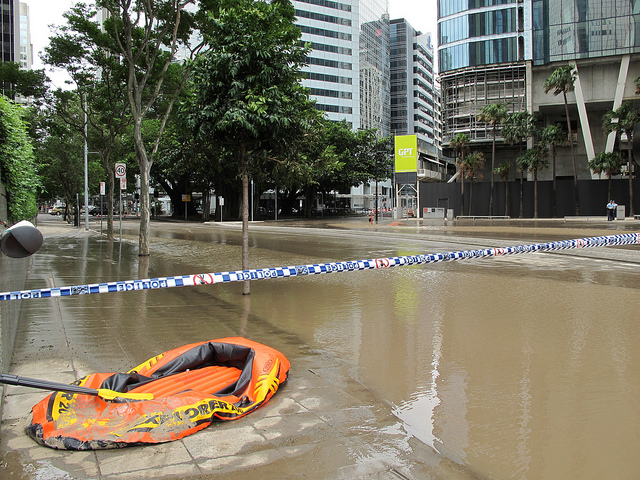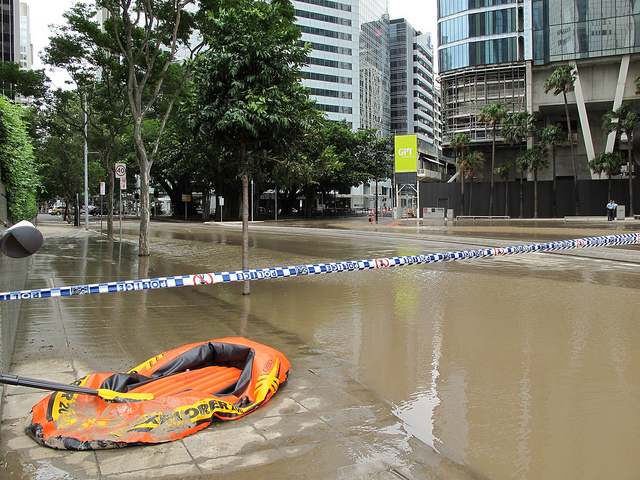 It’s hard to see how the West will benefit from, say, more floods.Photo: NZRicoIn a recent article in Newsweek, Nobel laureate economist Thomas Schelling argues that one of the greatest obstacles to addressing climate change is persuading the non-poor in the developed world to take the problem seriously. As he states:
It’s hard to see how the West will benefit from, say, more floods.Photo: NZRicoIn a recent article in Newsweek, Nobel laureate economist Thomas Schelling argues that one of the greatest obstacles to addressing climate change is persuading the non-poor in the developed world to take the problem seriously. As he states:
Estimates of lost world product due to climate change are moderate because the poor have so little to lose. More than a billion people, maybe 2 billion, are estimated to live on less than the equivalent of $2 per day. If a billion of those poorest people lost half their income, it would be an overwhelming tragedy, a true catastrophe, worse than all the earthquakes, floods, tsunamis, landslides, and fires of the past decade happening every year. But those billion people together would lose only $365 billion per year. That is less than 1 percent of world income! They have so little to begin with that what they can lose doesn’t amount to much of a statistic. But they can lose tragically.
Schelling’s quote is a telling example of why GDP is a flawed metric for communicating the risks of climate change. In a world characterized by gross income disparities, treating a dollar’s worth of impact in a poor country the same as a dollar’s worth of impact in a rich country is a surefire way to mask the real impacts of climate change. Yet, this is what almost all economic models of climate change do, and many economists think it is necessary to avoid value-laden comparisons. Attaching greater weight to impacts in poor countries would cause global estimates of the economic damages of climate change to rise substantially.
There is little doubt that poor countries are the most vulnerable to the impacts of climate change. This is one of the cruelest ironies of climate change — the countries most responsible for greenhouse-gas pollution will be the least affected.
Schelling warns that food production in the developing world will be hardest hit by climate change. Soaring food prices worldwide in the wake of record-breaking droughts and floods are a sobering reminder of worse yet to come. But I disagree with Schelling when he surmises that “nearly all the rest of Western income is substantially impervious to climate, or may benefit slightly from warming” because agriculture comprises less than 5 percent of GDP in the U.S. and Europe.
Agriculture in the U.S. is not immune to the effects of climate change. Any near term potential benefits from longer growing seasons and increased CO2 fertilization are now expected to decline as temperatures rise steadily later in the century; as weeds, pests, and diseases flourish under the new climate conditions; and as the incidence of extreme weather events rises. The most recent national assessment of climate impacts by the U.S. Global Change and Research Program warns that even moderate increases in temperatures can decrease yields of wheat, corn, sorghum, beans, rice, cotton, and peanuts.
If we assume a worst case scenario where climate change greatly impairs U.S. agricultural productivity, the effects would surely be felt economy-wide. Rising food prices would drive inflation, reducing both consumer and investment spending. Social unrest resulting from food shortages worldwide could disrupt global commerce. Agriculture is a small component of GDP, but it is vital. The U.S. may be better able to adapt to changed growing conditions than most poor countries, which is one of Schelling’s points, but this assumes we acknowledge the risks and meet them head-on.
Schelling suggests that Western income may actually benefit from warming. He may be referring to some climate economic models that include dubious benefits from warming in the near term, such as longer growing seasons, subjective preferences for warmer climates, an increase in summer recreational activities, and a decline in cold-related deaths. These same models heavily discount future climate damages and ignore the potential for catastrophic impacts. The problems with these models, which lead to vastly different conclusions than climate science, are known and debated — it is not universally accepted in economics that the U.S. benefits from climate change.
Schelling concludes that we face a major problem solving climate change until we can “persuade the non-poor in the developed world to take the problem seriously.” I agree and would add economists to the list of those who still need to be persuaded.



